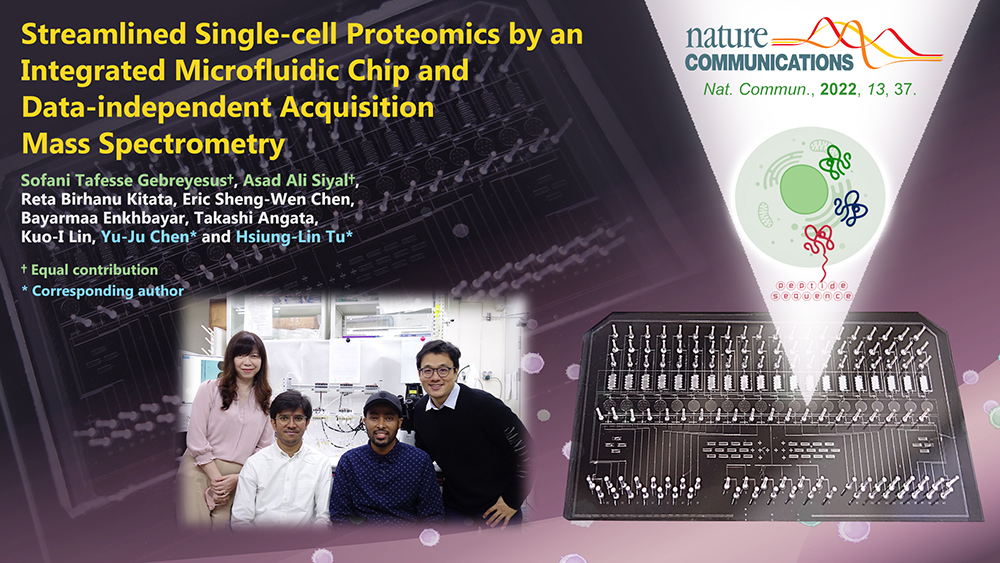中央研究院化學研究所-學術研究
開發新穎晶片整合質譜技術進行單細胞蛋白質體分析
Streamlined Single-cell Proteomics by an Integrated Microfluidic Chip and Data-independent Acquisition Mass SpectrometryNature Communications 2022, 13, 37.
S. T. Gebreyesusⴕ, A. A. Siyalⴕ, R. B. Kitata, E. S.-W. Chen, B. Enkhbayar, T. Angata, K.-I Lin, Y.-J. Chen* and H.-L. Tu*

Single-cell proteomics (SCP) can reveal cellular phenotypic heterogeneity and cell-specific functional networks underlying biological processes. Yet its development is relatively limited until recent years. To improve the sensitivity and proteome depth of SCP, a team led by Dr. Hsiung-Lin Tu and Dr. Yu-Ju Chen at Institute of Chemistry recently reported a highly streamlined workflow, which combines microfluidic chips for all-in-one proteomic sample preparation and data-independent acquisition (DIA) mass spectrometry (MS) for proteomic analysis down to the single-cell level. The proteomics chips enable multiplexed and automated cell isolation/counting/imaging and sample processing in a single device. Combining with DIA-MS using project-specific mass spectral libraries, this strategy profiles on average ~1,500 protein groups across 20 single mammalian cells. Applying the chip-DIA workflow to profile the proteomes of adherent and non-adherent malignant cells, the method demonstrates a dynamic range of 5 orders of magnitude with good reproducibility and < 16% missing values between runs. Taken together, the chip-DIA workflow offers all-in-one cell characterization, analytical sensitivity and robustness, and the option to add additional functionalities in the future, thus providing a basis for advanced single-cell proteomics applications.
This study is supported by Academia Sinica and Ministry of Science and Technology in Taiwan. Two Ph.D. students in the TIGP program, Mr. Sofani T. Gebreyesus and Mr. Asad A. Siyal, share the co-first authorship in this study. The corresponding authors include Dr. Hsiung-Lin Tu and Dr. Yu-Ju Chen. Additional collaborators include Dr. Kuo-I Lin and Dr. Takashi Angata from the Genomics Research Center and Institute of Biological Chemistry in Academia Sinica. The full article entitled “Streamlined single-cell proteomics by an integrated microfluidic chip and data-independent acquisition mass spectrometry” is available at the Nature Communications website: https://www.nature.com/articles/s41467-021-27778-4.
單細胞蛋白質體學能解析細胞層級之表型與訊息路徑的差異性。相較於基因體學與轉錄體學,蛋白質體學和細胞執行功能與藥物治療有更直接關聯,然而其相關之技術發展卻相對受限。為了突破分析靈敏度與可靠性,本所涂熊林與陳玉如團隊近期開發了一站式蛋白體製備工作站。其包含前端客製微流晶片與後端高解析質譜分析。此工作站可直接進行細胞抓取、計數與影像擷取,進而顯著改善單細胞製備效率、減少樣品損失與增加重複性。搭配團隊開發的數據依賴擷取質譜儀,此平台可從單細胞鑑定約1500種蛋白質且具定量優勢,並可透過後續分析將其置於訊息網路進行相關的研究探討。研究團隊正著手積極開發下一世代晶片,期望能將此技術用來解決重要的生物問題,亦預期此平台將有助於揭示在不同生理和病理中單一細胞調控的機理。
此研究由本院以及科技部支持。共同第一作者為涂熊林實驗室博士生宋方寧(Sofani Gebreyesus)與陳玉如實驗室博士生史昂德(Asad Siyal);通訊作者為涂熊林助研究員以及陳玉如特聘研究員。研究團隊還包括本院基因體中心林國儀研究員與生物化學研究所安形高志副研究員。期刊論文標題為 “Streamlined single-cell proteomics by an integrated microfluidic chip and data-independent acquisition mass spectrometry”,可於以下連結閱讀: https://www.nature.com/articles/s41467-021-27778-4。
